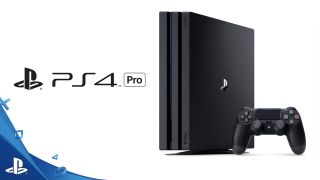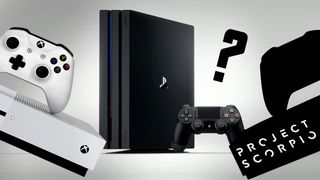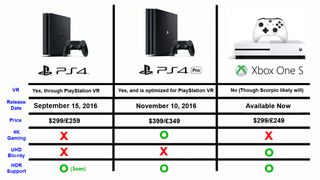PS4 Pro is the product of an industry obsessed with disproving its inferiority to PC
Stop competing against PCs and start enjoying consoles for what they are

PS4 Pro has had the gaming community giddy for months now. With all this talk of HDR and faux-4K we've almost abandoned our appreciation of the regular PS4s and Xbox Ones as the allure of new hardware made our eyes grow large and our current consoles feel somehow less spectacular than they are.
And while there are plenty of things to be justifiably excited for beneath the hood of this tinkered console, the changes feel less like a justifiable 'upgrade' and more like a console industry obsessed with the lengthening shadow of PC and the toxic topics of 'inferiority' and 'master races'.
It all started back with the PSOne and it's been snowballing ever since.
We knew this day would come, after all. Years of slimline and revamped Xbox 360s and PS3s throughout the last generation was the start (remember, the Xbox 360 had three individual designs, not to mention all the memory-based iterations), sowing the seed for the state of things to come. These half-step 'upgrades' dulled our senses to the sheer ridiculousness of it all. But lest we forget, it all started back with the PSOne and it's been snowballing ever since.

PlayStation 4 Whoa!
So here we are – a new, iterative console within three years of the original. It seems a bit mad when you think about it, but it's something that's become inherent to how we view our industry. Every generation we're bombarded with 'informed' analysts adamant this gen will be the last in the form of traditional consoles, a transition towards an upgraded platform a la PC proclaimed as nigh on certainty. Consoles have been 'closed boxes' for so long that the move to something more revolutionary is an inevitability we've been educated to expect.
That hyper-awareness of the PC market, where the power of your gaming experience is limited only by your bank balance (and attraction/aversion to neon backlights) has permeated every fabric of console development, especially so with the advent of VR and the near limitless potential for HTC Vive and Oculus Rift. So it should come as no real surprise to see Sony attempting to close a distance with the upgradeable potential of the overclocking crew.
Why are so many of us obsessed with this bizarre need to compete when it's both irrelevant and potentially harmful?
But why are so many of us obsessed with this bizarre need to compete when it's both irrelevant and potentially harmful for the rest of the generation?
Unless Sony and Microsoft can somehow create modular console designs that are a.) financially viable and b.) sustainable in such a competitive market – which seems highly unlikely considering Sony has only just agreed to allow software mods on PS4 – the need to chase the coat tails of the PC is nothing more than a moot point.
Get daily insight, inspiration and deals in your inbox
Get the hottest deals available in your inbox plus news, reviews, opinion, analysis and more from the TechRadar team.
Pro-bono
But it's a problem Sony is making all the worse with its claims that PS4 Pro is a significant generational leap for PlayStation. But is it really?
Are three years really enough for the biggest selling console of all time to be moved one step down the food chain? Sony has said on numerous occasions that the regular PS4, and its near 40 million active users, aren't being deemed irrelevant with the introduction of PS4, but with so many developers no doubt being urged to build with the extra graphical and processing oomph of PS Pro in mind it's hard to feel like vanilla PS4 owners are going to find themselves playing an 'inferior' platform.

If that's the case, and development begins to originate with PS4 Pro and 'Pro modes' in mind, the potential for an even greater divide could become a reality – even if it's not division through technological performance (which it almost certainly will be in the years to come), simply creating a distinction within your own brand seems like total lunacy.
Sure, your games will look better – should you have a TV that supports HDR and 4K – but the fact of the matter is PS Pro is marketed and covered as a prologue to PS5 when in reality it's just a beefier console designed to make PS VR feel legitimately competitive against the Vive and the Rift.
That's not to play down what Mark Cerny and the rest of the hardware team at Sony has achieved with the specs inside the new system – the GPU power of PS4 Pro is double that of PS4, after all, meaning it can it'll be to run games with far less tearing and slowdown.
Right now, that seems like a nice bonus, one that will make your games look and run more like the pre-rendered footage we're all so used to swallowing at the big press events, but it's going to become an issue when all that extra processing power becomes a necessity rather than an extra boon.

Infinite possibilities
Sony's need to make PlayStation feel relevant in a competition that doesn't need to exist will come back to bite it in the backside (and Microsoft too, should the mysterious Project Scorpio prove to be a tweaked version of Xbox One that arrives in the next year or two). Console lifecycles work best when left to ferment. Let's not forget some truly incredible games have been built on aging technology – God of War 2, The Last of Us and Bioshock Infinite to name but a few.
Reduced to potentially half the usual life cycle, consoles could well become as disposable as software, something that literally no gamer would ever sign up for. As for the turnover of hardware, that's only going to alienate users who will be forced to upgrade their hardware mere years into their investment. More importantly, it raises the question: Will all this half-step iterations have an effect on the number of people who adopt the PS5 in its first few years? It certainly could if the new reality of console development is the one we have to accept.
It's time for us to stop obsessing with a futile war that doesn't need fighting and start enjoying our consoles for what they are.
Here's the kicker: when PS4 Pro launches next month, PC will still be a 'superior' platform in terms of hardware performance. Which means the PlayStation VR still won't be anywhere near catching up with the Vive and the Rift in the specs department.
But here's the thing: maybe it doesn't matter if consoles are as powerful as PCs.
PS4 and Xbox One are incredibly forward-thinking consoles, and we haven't even come close to seeing either working at their absolute limits. It's time for us to stop obsessing with a futile war that doesn't need to be fought and start enjoying our consoles for what they are.
- Even the best gaming laptops could outpace the PS4 Pro
Most Popular


